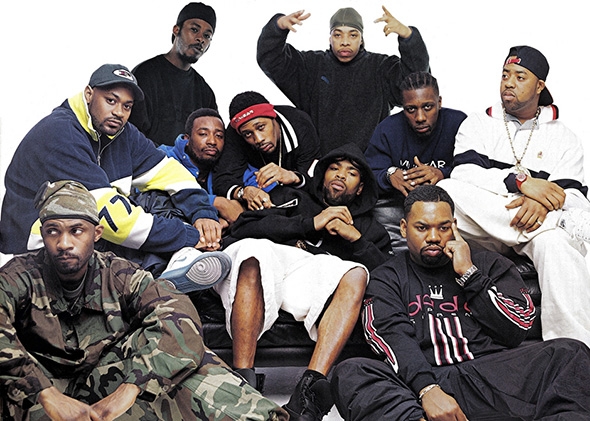

Killa Bees neva sleep! Its Wu-Tang Week! But before we get into the music of this groundbreaking group, let’s look at how they changed the game.
Five ways in which the legendary Wu-Tang Clain has shaped hip-hop over the last two decades.
Harnessing a group dynamic
Managing a group of nine supremely talented and stylistically diverse rappers —Ghostface Killah, GZA, Inspectah Deck, Masta Killa, Method Man, Raekwon, RZA, U-God and the now-deceased Ol’ Dirty Bastard — was never going to be easy, so why even bother?
As part of Wu-Tang’s initial contract with Loud Records in the early ’90s, each member was free to pursue separate deals for their individual solo careers, and the likes of Def Jam (Method Man), Elektra (Ol’ Dirty Bastard) and Geffen (GZA) quickly came calling with offers. Rather than concentrating under a singular cumbersome entity, this allowed the Wu-Tang brand to quickly permeate the music industry — resulting in a string of classic albums that both highlighted each Clansman’s wildly original style while presenting their collective aesthetic to a larger audience. Their successful divide-and-conquer strategy opened the door for large crews such as The Diplomats, Odd Future and Beast Coast to follow.
Sticking with their own language
There’s a reason member RZA’s book The Wu-Tang Manual contains a glossary: From the beginning, Wu-Tang painted vivid pictures of urban life using the language of the streets. But it was more than just slang; they helped introduce a new lexicon that weaved influences from Five Percent Nation (an offshoot of the Nation of Islam) philosophy, Asian cinema, food and other elements into a uniquely original vocabulary. “Biscuits” were guns, “sharks” were those who “bit” (or copied) their style, “Earths” were women. Rather than simplifying their speech for a mass audience, they brought that audience into their own world, speaking to them on their own terms with their own words.

Pushing production forward
In the decade prior, producers such as Marley Marl and Prince Paul helped make sampling an integral element of the hip-hop aesthetic. But with Wu-Tang, RZA took things to another level. Using dusty, eccentric soul and “blaxploitation” movie soundtracks as his source material, along with poorly dubbed dialogue and sound effects from low-budget kung-fu flicks, he transcended simply making beats, arguably becoming hip-hop’s first great composer. Mixing these elements, he forged atmospheric, bizarre and hypnotic sounds that continued to influence countless producers in subsequent years, including the likes of Kanye West and The Alchemist.
Bringing on the East Coast revival
For many, the grimy New York feel of the Clan’s 1993 debut Enter the Wu-Tang (36 Chambers) is synonymous with ’90s hip hop, but at the time of its release, it was the exception to the rule.
The glossy funk sounds emerging from Dr. Dre’s Death Row Records dominated the commercial charts, while the heroes of New York’s first hip-hop Golden Age, such asRakim and Kool G Rap, were transitioning into new phases of their careers. The Clan responded by taking a different path, one that shifted away from California’s sunshine and gang culture toward a harsher, more menacing and aggressive style that reflected life in Staten Island, the group’s home base.
Epitomized by breakout singles Protect Ya Neck and C.R.E.A.M., the album’s success shifted attention back toward New York, helping set the scene for landmark releases by the Notorious B.I.G., Nas and others who would solidify the East Coast raprenaissance.
Expanding into different ventures
No one could ever accuse the Clan of thinking small. They were pioneers in creating their own fashion line, Wu Wear, which was been sold in major department stores as well as their own official outlets, and they even released a limited-edition shoe through Nike. In 1999, they took on the video-game industry with Wu-Tang: Shaolin Style for Sony’s Playstation. Their success in translating the Wu-Tang Clan brand into commercial opportunities created space for the next generation of hip-hop entrepreneurs, such as Jay Z and 50 Cent, to expand their own empires.
